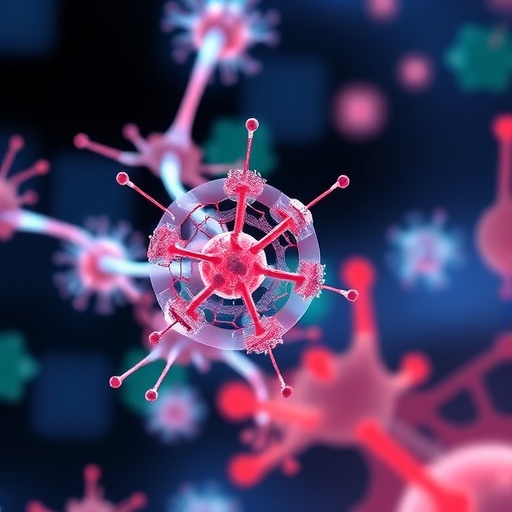In a groundbreaking advance that could redefine the future of cancer immunotherapy, researchers at UCLA have successfully demonstrated the capacity to genetically engineer a patient’s own blood-forming stem cells to produce an enduring supply of functional T cells. These potent immune cells serve as the body’s primary agents in identifying and eradicating cancer cells. By transforming the patient’s hematopoietic stem cells into a persistent in vivo “factory” for tumor-targeted T cells, this novel approach holds promise for overcoming critical limitations seen in current immunotherapy treatments, particularly against notoriously resistant solid tumors.
Conventional T cell therapies, including CAR-T cells and T cell receptor (TCR) therapies, have shown remarkable clinical responses in certain blood cancers but face significant challenges when applied to solid tumors. A major hurdle involves the transient nature of infused T cells—they often lose efficacy as the immune cells either become exhausted or die off after a limited period. The UCLA team sought to address this challenge by reprogramming the patient’s hematopoietic stem cells to continuously generate fresh, cancer-specific T cells, potentially sustaining an anti-tumor immune response indefinitely. This strategy, in essence, implants a self-renewing immune system upgrade.
.adsslot_314KfLW0Yn{ width:728px !important; height:90px !important; }
@media (max-width:1199px) { .adsslot_314KfLW0Yn{ width:468px !important; height:60px !important; } }
@media (max-width:767px) { .adsslot_314KfLW0Yn{ width:320px !important; height:50px !important; } }
ADVERTISEMENT
The patient cohort consisted of individuals suffering from aggressive sarcomas, where conventional therapies often fall short and relapse rates are notoriously high. In these patients, even after chemotherapy or surgical resection, disease recurrence is common and treatment options remain limited. By focusing on this difficult-to-treat population, the study aimed to validate the feasibility and safety of implanting genetically modified stem cells as a durable cancer-fighting strategy.
Early outcomes from the trial were encouraging. Researchers observed successful engraftment of the engineered stem cells within the patients’ bone marrow, accompanied by the sustained production of cancer-specific T cells detectable for several months post-treatment. In one noteworthy case, tumor regression was documented, along with the persistence of newly generated immune cells that continuously surveilled and fought the malignancy. Imaging and molecular assays confirmed that the reprogrammed stem cells had taken root and were functioning as intended within the host.
The procedure’s complexity and inherent risks underscore the necessity for specialized institutions and patient selection to maximize safety and efficacy. Nonetheless, parallels can be drawn to the early years of bone marrow transplantation, which initially presented logistical and clinical challenges but ultimately transformed patient care through technological refinement and experience accumulation. As such, the UCLA team anticipates that with further development, this therapy could become more accessible and streamlined.
Beyond oncology, the implications of using engineered stem cells as an enduring source of specialized immune cells extend to a broad spectrum of diseases. Dr. Nowicki suggests applications could include chronic viral infections like HIV, where long-lasting immune surveillance is critical, as well as autoimmune conditions, where immune modulation might be achieved by retraining the immune system. This modular, stem cell-based immune programming approach opens new avenues far beyond cancer, representing a transformative platform for immune engineering.
Perhaps the most profound takeaway from this research is the demonstration that it is biologically and clinically feasible to create a renewable, personalized immune defense against cancer by reprogramming the patient’s own stem cells. While not yet curative or widely available, this strategy challenges the paradigm of temporary treatments and stimulates vision for future immunotherapies that not only combat tumors but sustainably prevent their recurrence.
This milestone was achieved through a decade-long collaborative effort of over 30 scientists and clinicians, combining expertise in stem cell biology, gene therapy, oncology, and immunology. Acknowledging the extensive foundational work preceding the clinical trial, the investigators hope that this study catalyzes further research and accelerates the pathway toward next-generation immune cell therapies capable of delivering durable cancer control.
Funded by a consortium including the California Institute for Regenerative Medicine, the National Institutes of Health, Hyundai Hope on Wheels, the Tower Cancer Research Foundation, and the Parker Institute for Cancer Immunotherapy, this research exemplifies the power of integrated scientific innovation and cross-disciplinary collaboration. The involvement of faculty from UCLA’s David Geffen School of Medicine, the Eli and Edythe Broad Center of Regenerative Medicine and Stem Cell Research, UCLA Health Jonsson Comprehensive Cancer Center, and the California Institute of Technology underpin the strength of this endeavor.
Looking ahead, the team is optimistic that continued refinement of genetic engineering methods, improved conditioning regimens, and enhanced understanding of tumor immunology will contribute to the broader application and increased safety of this stem cell-based immunotherapy platform. As progress accelerates, this novel paradigm has the potential to significantly shift clinical practice, enabling lifelong immune protection for cancer patients and redefining the ultimate goal of cancer treatment: not just remission, but durable cure and prevention.
Subject of Research: Cancer immunotherapy via genetically engineered hematopoietic stem cells producing tumor-specific T cells.
Article Title: Pioneering Stem Cell Engineering Yields Renewable Cancer-Fighting Immune Cells in Humans
News Publication Date: Not explicitly stated
Web References:
Nature Communications article
DOI link
References: Clinical trial led by Dr. Theodore Scott Nowicki et al., published in Nature Communications in 2025.
Image Credits: Not specified
Keywords: Cancer, Sarcoma, Cancer research, Stem cells, Immunotherapy
Tags: cancer immunotherapy advancementsCAR-T and TCR therapy challengesclinical trial breakthroughsgenetically engineered T cellshematopoietic stem cell transformationinnovative cancer treatment strategiesNature Communications publicationovercoming solid tumor resistancepersistent anti-tumor immune responserenewable immune cell productionself-renewing immune system upgradeUCLA stem cell research





